The Significance of Wine in Game of Thrones
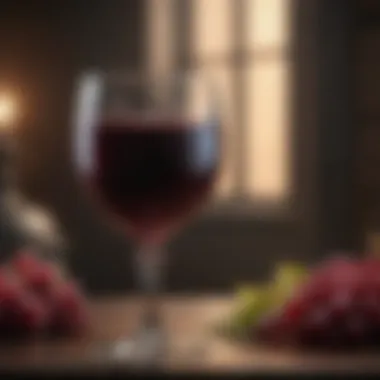
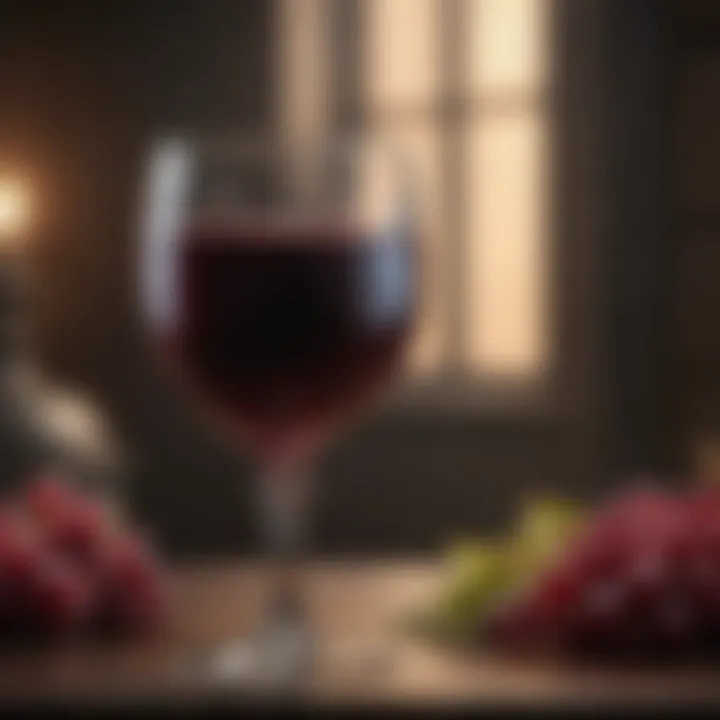
Intro
Wine plays a unique and intricate role in the world of Game of Thrones, a universe fraught with political intrigue, social hierarchies, and deep character relationships. This article explores how wine is not only a motif of luxury but also a symbol of power and status. Through various characters, episodes, and lore, we see each pour and sip carry weight in the narrative.
Character Dissections
Detailed Analysis of Key Characters
Wine is often intertwined with pivotal moments for Game of Thrones characters. For instance, Tyrion Lannister frequently uses wine as a means to navigate the treacherous waters of court politics. His fondness for the drink not only provides him a temporary escape from his grim reality but also serves as a social lubricant during tense negotiations.
In contrast, characters like Cersei Lannister wield wine as a tool for manipulation. Her strategic sips from goblets often are not merely personal indulgences; they reflect her calculated approach to maintaining power.
Character Development Throughout the Series
The relationship each character has with wine mirrors their development. For example, Jon Snow starts as a reluctant leader, often found consuming in the company of comrades. His journey, from an outsider to the central figure in the Night's Watch, sees his drinking evolve from casual indulgence to reluctant responsibilities. Meanwhile, Daenerys Targaryen’s earlier avoidance of wine signifies her fierce commitment to her ambitions. Over time, as her character shifts into a position of authority, her drinking habits change, almost as a rite of passage into her role as the Mother of Dragons.
Impact on the Overarching Storyline
Wine becomes a silent witness to the changes in alliances and betrayals. The infamous Red Wedding is not only framed by bloodshed but also by the ceremonial wine that is shared prior. This juxtaposition amplifies the horror of the betrayal, illustrating how wine serves as a backdrop to character decisions and plot twists.
"Wine has often signified celebration or tragedy; its presence amplifies every emotional turn in the series."
Episode Breakdowns
Recap of Significant Events
Key moments in Game of Thrones often occur in the presence of wine. From lavish feasts to somber gatherings, these scenes evoke the complex interplay between characters. In Season 3, during the infamous wedding feast, the wine-drinking ritual serves to mask underlying tensions, hinting at the betrayal to come.
Exploration of Themes and Symbolism
The themes of power and betrayal are amplified with wine's symbolic role. When characters raise a toast, it signifies trust, but when the wine is poured, it can also serve as a harbinger of despair. The drink embodies the duality of celebration and tragic ends throughout the series, echoing the fates of numerous characters.
Key Moments and Their Implications
During the meeting of various houses, wine often facilitates discussions that lead to crucial alliances or conflicts. For example, the blending of wines from different regions symbolizes the merging of dynasties and the fragility of these new ties.
Lore Explorations
Delving into the Rich History and Lore of Westeros
Wine has deep roots in the lore of Westeros. The production and consumption of wine reflect the cultural nuances of different regions. House Baratheon and House Tyrell, for example, have distinct wine identities that denote their heritage. The lore surrounding these houses is steeped in their connection to the vineyards they control.
Uncovering Hidden Details and Connections
Wine names often carry historical significance. Names like Arbor Gold established the Tyrell connection to wealth and affluence. Furthermore, the reference to old wines suggests endurance, much like the legacy of the families themselves.
Exploring the Cultural and Mythical Aspects of the World
In some cultures within Westeros, wine is associated with rituals and feasts, indicating not just social status but historical importance. The act of sharing wine can include blessings or curses, depending on the context, showcasing how deeply ingrained this beverage is in the societal fabric.
Fan Theories
Compilation of Popular and Intriguing Fan Theories
Fans have speculated extensively about the significance of wine beyond mere consumption. Some theories suggest that certain wines symbolize character arcs or predict fates.
Evaluation of Theories Based on Evidence from the Show
Analyzing episodes where wine plays a pivotal role reveals connections that validate fan theories. The way a character interacts with wine can hint at their fate or moral alignment.
Speculation on Future Plot Developments
As the story progresses, fans wonder if wine will continue to reflect shifts in power dynamics. Will future seasons see new wines become symbols of emerging leaders and their destinies?
Finale


Wine, throughout Game of Thrones, transcends basic indulgence. It serves as a powerful narrative device, enriching character relationships, underpinning failures and triumphs, and providing a lens into the socio-political structures of Westeros. Each sip taken provides more than just enjoyment; it offers an insight into the characters and their intertwined fates. The analysis of wine’s significance thus highlights its role as a touching point in the expansive and complex storytelling of Game of Thrones.
Prelims to Wine in Westeros
The significance of wine in Game of Thrones goes beyond mere indulgence; it serves as a vital element that intertwines with the cultural, social, and political fabric of Westeros. From extravagant feasts to subtle interactions, wine plays an intricate role in showcasing the varied life experiences of the characters. This section will focus on how the presence of wine reveals the nuanced dynamics at play, offering insights into the values, hierarchies, and relationships of the people inhabiting this complex world.
Understanding the historical context of wine in Westeros provides a backdrop for its portrayal in the series. The various wines mentioned not only reflect the traditions but also hint at the economic prioritization given to this commodity. Additionally, the cultural practices related to wine consumption demonstrate its importance as a social lubricant, allowing for connections to form or barriers to rise.
Overall, analyzing wine's role enriches the viewing experience, revealing layers that contribute to character development and plot progression.
The Historical Context of Wine in Westeros
The historical significance of wine in Westeros is closely linked to the geography and climate of the regions. Notably, areas such as the Arbor and Dorne are renowned for their winemaking traditions. The Arbor Gold, for example, symbolizes not just quality but the prosperity of House Tyrell. Dorne, with its warm climate, produces robust wines that represent the fiery spirit of its people.
Wine production in Westeros has clear historical roots. It dates back to the Age of Heroes, suggesting that it has long been an integral part of societal rituals and ceremonies. The presence of wine during significant political events is not coincidental. It serves as a testament to the stability or fragility of alliances. The practice of sharing wine often follows a theme of ceremony, reinforcing trust or loyalty among the nobles.
It is also on key occasions that wine stands out, revealing relationships between different houses. A tale of vengeful plots or unspoken alliances is often hinted through the wines served. The historical references and the relationships woven through these wines illustrate a social canvas that is as rich as the wines themselves.
Cultural Practices Surrounding Wine Consumption
Culturally, wine drinking in Westeros is ritualistic and multifaceted. Significant feasts and gatherings often center around shared bottles and goblets. These rituals not only mark celebrations but also serve as a means to forge bonds. Sharing wine is a universal act of peace among the lords and ladies. This gesture carries a weight that few can dismiss, reflecting mutual respect or negotiation.
Moreover, different types of wine correspond to various social classes. Fine wines are generally the privilege of the elite, while common folk may partake in simpler beverages. This distinction sets a clear divide, indicating the hierarchy present in the society.
The communal aspect of wine consumption is not just limited to joyous occasions. It also plays a role in conflicts and political discussions, providing a setting where secrets might spill as easily as the wine itself.
In summary, the cultural practices surrounding wine consumption in Game of Thrones reveal much about character motivations and societal structures within Westeros. From extravagant banquets to heavy political discussions, wine is always a silent participant that affects the dynamics at play.
Symbolism of Wine in the Series
Wine in the world of Game of Thrones serves more than just a luxurious sip; it conveys layers of meanings that enrich the narrative. The visibility of wine in various scenes highlights its importance in demonstrating social status and political machinations within Westeros. This substance acts as a symbol that resonates with diverse themes such as power, loyalty, and betrayal, playing a critical role in character interactions and development. As viewers navigate the complex world of the Seven Kingdoms, wine offers a lens to understand these characters and their motivations more deeply.
Wine as a Status Symbol
In Game of Thrones, wine is consistently associated with nobility and wealth. This connection manifests through the types of wine consumed by different characters, which marks clear distinctions between social classes. For instance, the sophisticated Arbor Gold, known for its exquisite quality and favored by the wealthy elite, frequently appears at lavish feasts held by houses such as Tyrell. Here, it not only serves as a drink but also as an identifier of the host's affluence and refined taste.
Here are some noteworthy points regarding the status symbolism of wine:
- Exclusive Varieties: Certain wines like Dornish Red indicate specific regions, emphasizing territorial pride.
- Social Events: Feasts are occasions where the prominence of wine showcases hierarchy; more expensive wines are served to higher-status guests.
- Character Associations: Characters such as Lord Tywin Lannister and Margaery Tyrell often use wine to solidify their status, further embedding the drink into the social fabric of Westeros.
In one memorable scene, Tyrion Lannister’s choice of wine for a high-stakes family gathering not only reflects his wit but also serves as a subtle assertion of his place within the Lannister hierarchy, despite his lower rank due to his stature.
Wine and Power Dynamics
The presence of wine reveals underlying power dynamics in Game of Thrones. It is a tool used by various characters to influence others and navigate political landscapes. Wine acts as a social lubricant, facilitating conversations that can lead to both alliances and conflict.
- Manipulation: Characters often offer wine to disarm or sway others, signifying how drink can turn the tide in diplomatic negotiations. For example, Cersei Lannister frequently employs wine during discussions with potential allies, illustrating its role in manipulation.
- Signaling Trust or Distrust: The act of sharing wine can symbolize camaraderie or highlight betrayal. When characters refuse wine or prefer their own, it indicates suspicion or a desire for control over the interaction.
- Ritualistic Consumption: Ceremonies and treaties often involve shared drinking, thus binding parties in loyalty or complicating their relationships when one chooses to omit this gesture.
"In every cup of wine, a world of meaning swirls, reflecting the complicated alliances and treacherous paths characters tread throughout the series."
Characters like Petyr Baelish understand the significance of this beverage in staking claims to influence. His cunning maneuvers often involve wine-fueled discussions, positioning him as a master of leveraging social dynamics.
Notable Wines and Their Characters
The complexity of characters in Game of Thrones can be punctuated and highlighted through their relationship with wine. Different wines are associated with various characters, symbolizing their social status, personality traits, and their relationships with others. Understanding these wines enables viewers to grasp the subtleties of character motivations and the larger narrative.
The Arbor Gold: Elegance and Nobility
Arbor Gold, a white wine from the storied Arbor Isle, is synonymous with northern elegance and symbolizes highborn status among the houses in Westeros. This wine is usually consumed in the company of noble hosts. It often appears in scenes involving the Tyrells, particularly Margaery and Olenna Tyrell, reinforcing their image as sophisticated power brokers. The opulence associated with Arbor Gold is evident in its frequent appearances during moments of political maneuvering and opulent feasts.
Characters drinking Arbor Gold exhibit traits of refinement and a certain aloofness. It reflects their societal position and often acts as a backdrop to significant actions and decisions. The wine serves as a medium through which alliances can be formed or severed. In essence, Arbor Gold embodies the aesthetic of nobility while deepening the narrative fabric of the series.
Dornish Red: Heat and Passion
Dornish Red carries the essence of the fiery and passionate Dornish culture. This wine, often served at political gatherings or intimate affairs, reflects the vibrancy of House Martell. It serves not just as refreshment but as a stimulant for the passions and ambitions of those who indulge in it. Characters linked with Dornish Red, like Oberyn Martell, exhibit characteristics of carelessness and intensity.
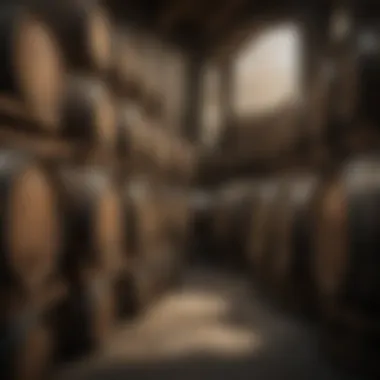
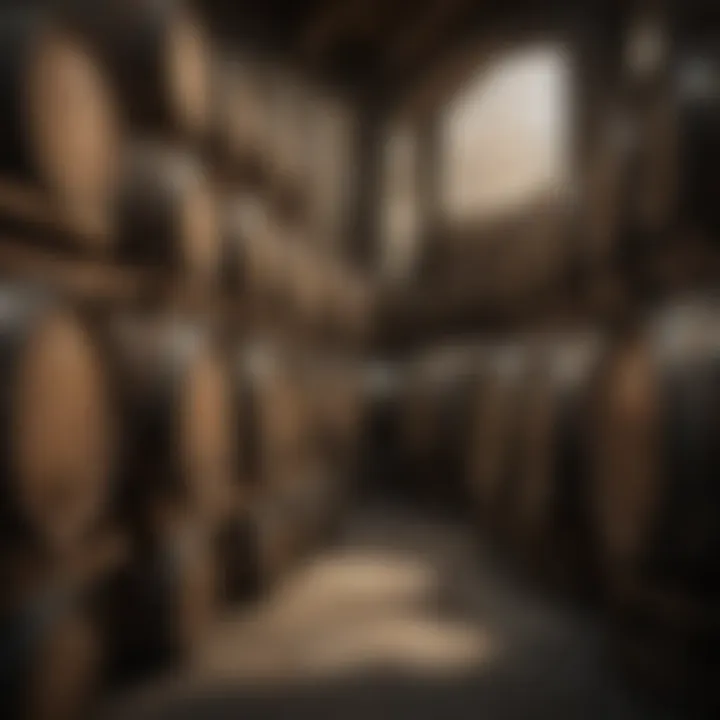
The wine often appears during key plot points, highlighting the emotional undercurrents and complex alliances that shape Westerosi politics. Its consumption marks moments of fervor, where desires manifest into actions that drive the story forward. Thus, Dornish Red represents a raw form of passion and activism, showcasing how the dramatic nuances of a character are intricately tied to what they drink.
The Common Table Wine: Daily Life and Realism
Unlike the exquisite Arbor Gold or the passionate Dornish Red, the common table wine symbolizes the everyday lives of the common folk in Westeros. This basic wine might not have the same prestige but represents realism and the daily struggles faced by the inhabitants of Westeros. Character interactions involving this wine often occur in taverns or informal settings, illustrating the more humble and relatable aspects of life.
Served at the common tables of various establishments, the common table wine also highlights moments of camaraderie and conflict among characters of lower status. For instance, scenes set in the streets or the tired taverns make use of common wine to showcase operational society's struggles. Thus, it becomes a narrative tool that grounds the story in reality while still maintaining the complexity of human relationships, be it in joy or conflict.
The Role of Wine in Social Gatherings
Wine occupies a prominent position in social gatherings within the Game of Thrones universe. Its presence is not merely for enjoyment; it serves deeper purposes that reflect the intricate relationships and power dynamics among characters. Social occasions where wine plays a role provide insight into the culture of Westeros. In many instances, these gatherings reveal not just personal connections, but also the underlying political implications that affect the realm.
Feasts and Celebrations
Feasts and celebrations in Game of Thrones showcase wine as an essential part of the festivities. These gatherings often symbolize unity, camaraderie, and celebration of victories or milestones. For instance, the wedding feast at the Red Wedding stands out. Here, wine flowed freely, masking the treachery that unfolded amidst the revelry.
In such scenes, wine is a tool for reinforcing social bonds. It brings people together, encouraging conversations and easing tensions. The act of toasting with wine highlights the significance of trust and friendship among characters. Words exchanged while raising a glass often carry weight; agreements made over wine can solidify alliances.
Additionally, specific wines, like Arbor Gold, amplify the prestige of these gatherings. Characters choose their beverages based on status, subtly indicating their place within the social hierarchy. The choice of wine can even serve as commentary on a person's character or ambition.
Through feasts, viewers witness how wine turns mundane meals into significant events that shape relationships and, occasionally, political futures. The interactions at these gatherings often underscore the fragility of alliances, where camaraderie can swiftly shift to hostility under the influence of wine.
Political Discussions and Alliances
Political discussions often find a place in the context of wine-laden gatherings. Wine provides a comfortable setting where noble characters engage in dialogue about alliances and betrayals. The casual atmosphere can lower guards, allowing for frank discussions that would be difficult in more formal settings.
For instance, characters like Tyrion Lannister utilize wine to navigate political landscapes. He often uses his wit and charm, enhancing dialogue with a glass in hand. The strategy behind this is profound; wine aids in fostering trust, though it is not without its risks.
The presence of wine in these discussions highlights its dual nature. While it can facilitate agreements, it can also lead to misunderstandings or incite conflicts. Characters who consume too much may reveal secrets or betray their true intentions. The interplay of alcohol and diplomacy serves as a reminder of the precarious nature of political alliances in Westeros.
"Wine, in its essence, transcends mere indulgence; it becomes a vessel for dialogue, deception, and sometimes, destiny."
Wine-Induced Revelations and Conflicts
The interplay of wine within the narrative of Game of Thrones serves as a compelling exploration of human psychology and social dynamics. Wine acts not just as a beverage, but as an enabling medium that often catalyzes pivotal moments of clarity—or chaos. The significance of this theme lies in its ability to reveal truths that are otherwise veiled by social facades and political games. When coupled with the context of power struggles and personal relationships, wine becomes an instrument of revelation, laying bare the contradictions and underlying motives of characters.
Critical Coincidences Under Influence
Throughout Game of Thrones, various moments highlight wine as a catalyst for critical coincidences. Characters often find themselves revealing their true feelings and intentions when under the influence of wine, setting off a chain of events that can have far-reaching consequences. One notable instance occurs during the infamous Purple Wedding. Joffrey Baratheon’s generous and chaotic consumption of wine escalates tensions and foreshadows dire outcomes. His inability to control himself while under the influence ultimately leads to his undoing. This moment emphasizes how intoxication can strip away the social decorum that typically governs behavior, allowing inner thoughts to surface.
Moreover, we see other characters like Tyrion Lannister leveraging wine to disarm others. His wit often flows more freely with a drink in hand, enabling him to navigate complex situations that require both charm and astuteness. This creates an atmosphere of unexpected revelations, where hidden agendas are unveiled. The strategic use of wine portrays the underlying theme of how truth can sometimes emerge from chaos and indulgence.
Revealing Secrets: Wine as a Catalyst
The role of wine in revealing secrets cannot be overstated. Under its influence, characters often divulge information that they would normally guard closely. This phenomenon illustrates how vulnerability can be exacerbated by the effects of alcohol. For instance, during the meetings of the council or informal gatherings, veiled truths often slip out, changing the trajectory of alliances and conflicts.
An example is the interaction between Jaime Lannister and Tyrion Lannister, who, after sharing a bottle, engage in a conversation that reveals the intricacies of their family’s dynamics. These interactions expose deeper psychological layers, showcasing the bonds formed and torn apart through shared experiences over wine. It enhances the narrative structure, allowing viewers to witness the often messy reality of human relationships.
In addition, the relationship between wine and secrets symbolizes a broader theme within the series—intimacy often births vulnerability. Characters learn that sharing a drink can lead to the sharing of burdens and hidden truths, creating moments of both solidarity and betrayal. Such themes make wine not merely a drink but a narrative device that propels character development and plot progression.
"Wine, when embraced by the lips of the conflicted, can yield both the bitter and the sweet—a duality that mirrors the essence of human nature itself."
These instances illuminate the complex nature of wine as a narrative element. It provides a platform for revelation, shaping the characters and their decisions in ways that resonate deeply within the context of Westeros’s political landscape.
The Production and Trade of Wine in Westeros
The significance of wine in Westeros extends beyond mere enjoyment. It intertwines with culture, economy, and even politics. Understanding the production and trade of wine in this fictional realm provides insights into how wine operates as a reflection of societal structures and relationships among the characters. The intricate trading networks and regional specialties highlight the importance of wine not only as a commodity but also as a vehicle for power and influence.
Regions Noted for Wine Production
Westeros is home to various regions recognized for their unique wines. Each region contributes to the diverse tapestry of flavors and characteristics found in the wines of the realm. Notably, the Arbor, located on the isle of the same name, is known for its exquisite Arbor Gold. This white wine embodies luxury and exclusivity, often served in high society gatherings. Another significant area is Dorne, known for its robust Dornish Red, which reflects the heat and passion of its land.
Moreover, the Riverlands produce a more practical common table wine, which resonates with the daily lives of the people. The distinction in wines from different regions illustrates the variety of lifestyles, wealth, and local cultures throughout Westeros. Understanding these regional differences enhances appreciation for the characters' choices and social interactions involving wine.
The Economics of Wine Trade
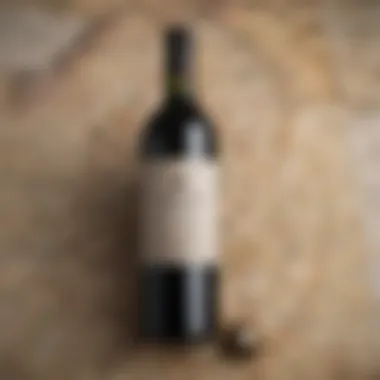
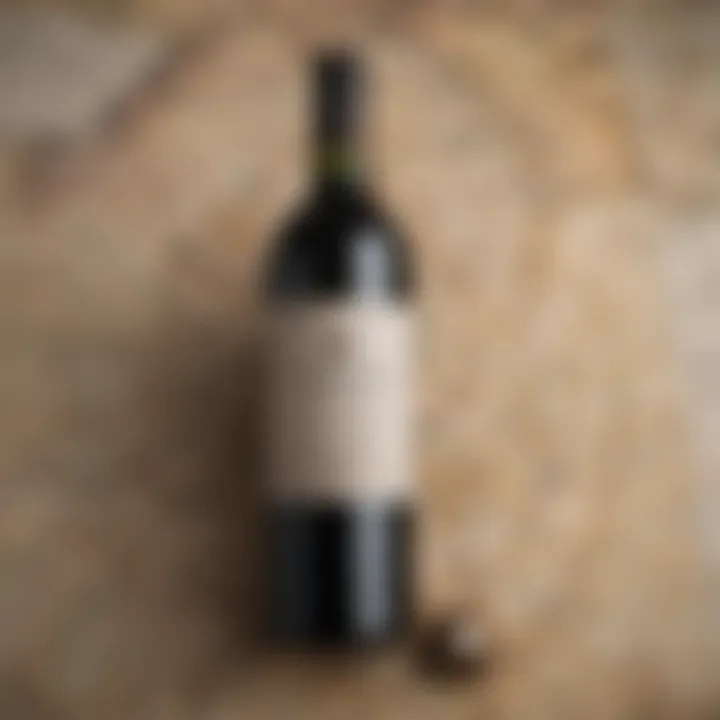
The trade of wine across Westeros exemplifies the broader economic realities of the realm. Wine is not just an indulgence; it is a product with substantial economic implications. The routes of wine trade often reflect political alliances and rivalries. For instance, the flow of Arbor Gold to the courts of the North signifies the relationship dynamics between the rich Southern houses and the Northern lords.
In addition, the economics of wine trade reveal the hierarchies of relationships within Westeros. Wealthy families use fine wines as gifts to solidify alliances or broker deals. Each bottle of wine carries with it not just flavor, but also a story of negotiation, power, and social standing.
"Wine is the fuel of relations; it lubricates the wheels of power in Westeros."
The delicate balance of production and trade in wines helps illustrate the vast network of dependence among characters. As such, wine serves as a critical narrative device, world-building the complexities of human interactions in the universe of Game of Thrones.
The Influence of Wine in Character Development
In Game of Thrones, wine serves more than just as a beverage; it plays a crucial role in the character development and narrative progression throughout the series. By examining how different characters engage with wine, we can uncover insights about their motivations, flaws, and relationships. This exploration reveals a rich landscape where wine influences and reflects the complexity and depth of characterization, shaping key arcs and actions.
The Relationship between Wine and Character Arcs
Wine consumption often marks significant moments in a character's journey. For example, Tyrion Lannister’s relationship with wine illustrates his struggles with identity and societal expectations. As he frequently imbibes wine, this reflects his clever wit and poignant loneliness. Likewise, Cersei Lannister uses wine as a distraction, a coping mechanism that masks her insecurities and ambitions. Cersei’s descent into madness is punctuated by her escalating reliance on wine. Thus, it mirrors her moral and ethical decline throughout the series.
Moreover, wine acts as a catalyst for pivotal character decisions, often altering their trajectories. When characters engage in toasts or casual drinking, it reveals alliances, tensions, or planned betrayals. The act of pouring and sharing wine creates intimate settings that strip away pretenses, allowing for genuine emotions and actions to surface.
Wine and Symbolic Acts of Betrayal or Loyalty
The symbolism of wine extends into themes of loyalty and betrayal, which are prevalent in the intricate web of relationships within Game of Thrones. Wine often reminds viewers of the fragility of allegiance. A seemingly innocuous toast can carry heavy implications. For instance, the infamous scene where wine is served before a strategic discussion often heightens the tension among characters. This simple act can foreshadow significant betrayals or reaffirm deep bonds.
Connections drawn through wine often emphasize the precarious nature of trust. Characters like Petyr Baelish and Littlefinger frequently use wine to manipulate situations. Their interactions often border on insincere; wine becomes a tool of persuasion and deception. This reflects not just personal ambitions but also the broader themes of survival within a cutthroat political landscape.
"In a world like Westeros, where family bonds can crumble and friendships dissolve, wine stands as both an elixir and an agent of discord, shaping destinies just as much as any sword or title."
In summary, wine intricately weaves into the narrative fabric, playing a pivotal role in character development. It offers a lens through which to examine motivations, foreshadow actions, and reflect the moral complexities that underlie the series’ profound storytelling.
Wine as a Narrative Device
Wine appears frequently throughout the Game of Thrones series and serves as a meaningful narrative device. Its presence does not merely embellish scenes, but actively contributes to the development of characters and plot. The uses of wine reflect the dynamics of power, loyalty, and betrayal, thereby enriching the storytelling.
One significant element of wine's narrative role is its ability to evoke atmosphere. In many scenes, wine is associated with elaborate feasts, solemn gatherings, or intimate conversations. The type of wine consumed often pairs with the setting and the characters involved, helping to convey their social status, emotional states, and relationships. For instance, the use of luxurious Arbor Gold emphasizes the wealth and prestige of the houses that showcase it. In contrast, simpler, more common wines illustrate the struggles of characters from less affluent backgrounds. This duality in wine choices reinforces the social hierarchies that dominate Westeros.
Another essential aspect of wine as a narrative device is its role in foreshadowing critical events. Often, wine-related occurrences precede significant plot twists or pivotal character decisions. Observing the behavior of characters when they indulge in wine can lead to an understanding of underlying tensions or forthcoming betrayals. For example, a revelry fueled by wine might mask growing conflict, creating suspense for the audience. Likewise, moments when wine is spilled or shared often carry symbolic weight, foreshadowing fragile alliances or deepening rivalries.
Through these means, wine serves not just as a mere backdrop, but as an active participant in the unfolding drama. It shapes the audience's perception of key moments, giving depth to the characters’ journeys and enhancing the overall experience of the story.
Building Atmosphere Through Wine
Wine plays an integral role in building the atmosphere within Game of Thrones. The beverage is not just a drink; it creates a sensory experience that draws viewers into the world of Westeros. The setting of a lavish feast, for instance, is often punctuated with wine, clinking glasses, and rich aromas, which adds to the visual appeal of such scenes. During gatherings, wine encourages camaraderie among characters while highlighting their rivalries.
When guests gather for significant occasions like weddings or political meetings, the selection of wine helps to set the tone. A fine wine can indicate celebration and opulence, while a less extravagant choice might reflect simplicity or conflict. The act of sharing a cup of wine can symbolize trust or alliance. Conversely, a refusal to drink can signal disdain or deeper unrest.
Wine also contributes to character development. Through their interactions with wine, viewers learn about the personalities of characters. The way they drink, share, or even waste wine offers insight into their values, priorities, and emotional states.
In general, wine assists in weaving a rich tapestry of relationships and events. The sound of pouring, the laughter, and murmurs of approval as wine is savored help transport the audience into each scene, thereby enhancing storytelling.
Foreshadowing Through Wine-Related Events
The narrative potency of wine extends to its use as a tool for foreshadowing in Game of Thrones. Often, events involving wine precede major revelations or turning points. For example, a character’s overindulgence can hint at their forthcoming downfall or moral conflict. A toast shared among enemies, while seemingly benign, may signal brewing tensions that will erupt later.
Wine can act as a harbinger of doom. When a character chooses to drink less or avoids certain wines, it can foreshadow imminent danger. The symbolism here is rich; wine represents indulgence but can also lead to reckless decisions.
The scattered occurrences of wine spills or broken glasses often occur just before tragic events. They underscore fragility in alliances and relationships. The visual of wine running in rivulets often symbolizes trust or loyalty being lost or wasted. Thus, wine serves as a powerful harbinger of the inevitable chaos to come.
Overall, wine in Game of Thrones is not merely an accessory; it is woven into the fabric of the narrative. It acts as an atmosphere creator and a device for foreshadowing. Through careful observation of wine-related moments, viewers might glean insights into the twists and turns of the storyline, deepening their engagement with the series.
The End: The Legacy of Wine in Game of Thrones
The exploration of wine in Game of Thrones reveals much about the culture and dynamics of Westeros. Wine is not just a drink; it embodies power, status, and social intricacies throughout the series. Its presence often signifies moments of connection, betrayal, and critical revelations. As viewers, understanding these implications deepens our appreciation for the narrative.
Lasting Impressions
Wine's portrayal in the series leaves enduring impressions. Each variety of wine symbolizes different characteristics of the regions and houses. For example, Arbor Gold represents both elegance and the wealth of House Tyrell. In stark contrast, Dornish Red depicts the fiery temperament of its people. These associations create a richer context for character interactions and events.
Wine's influence is apparent in memorable scenes. Such moments shape how characters are viewed, enhancing their complexities. The emotional weight that wine carries remains impactful long after episodes conclude. Its role goes beyond mere consumption; it evokes memories and feelings that resonate with the audience.
Wine's Enduring Role in Popular Culture
Wine's legacy within Game of Thrones transcends the series itself. As fans discuss and analyze their favorite moments, wine often becomes a focal point. Merchandise, such as wine glasses and labels from iconic regions, reflects this ongoing interest.
Events like wine tastings themed around the series continue to thrive, showcasing its importance in popular culture. Online discussions on platforms like Reddit keep conversations active. The beverage symbolizes the connection fans share to the show's lore and community.



